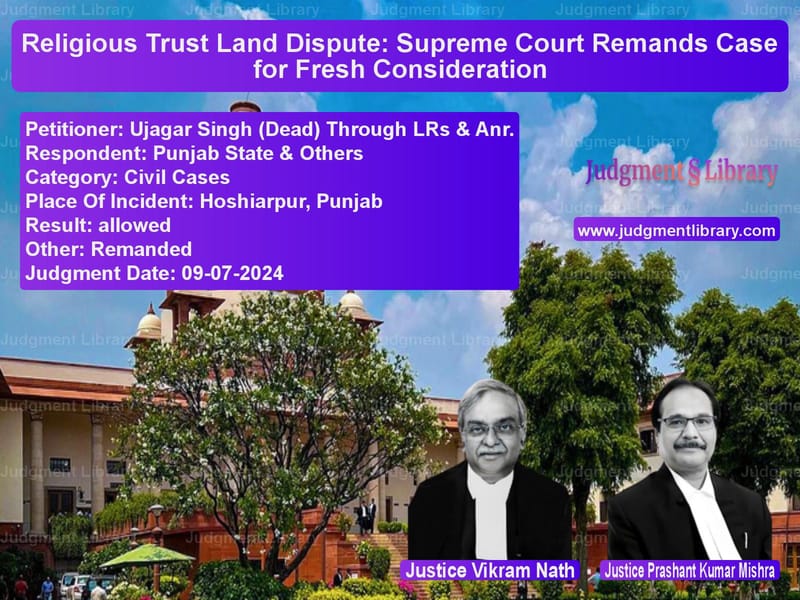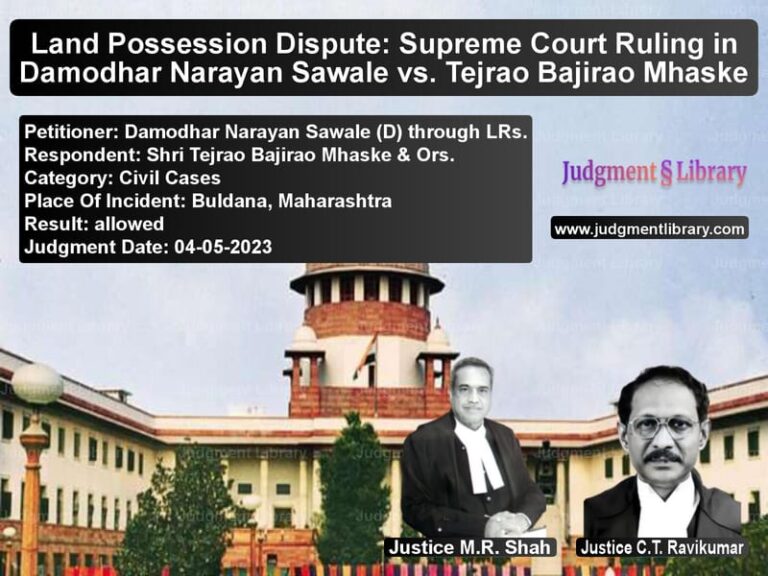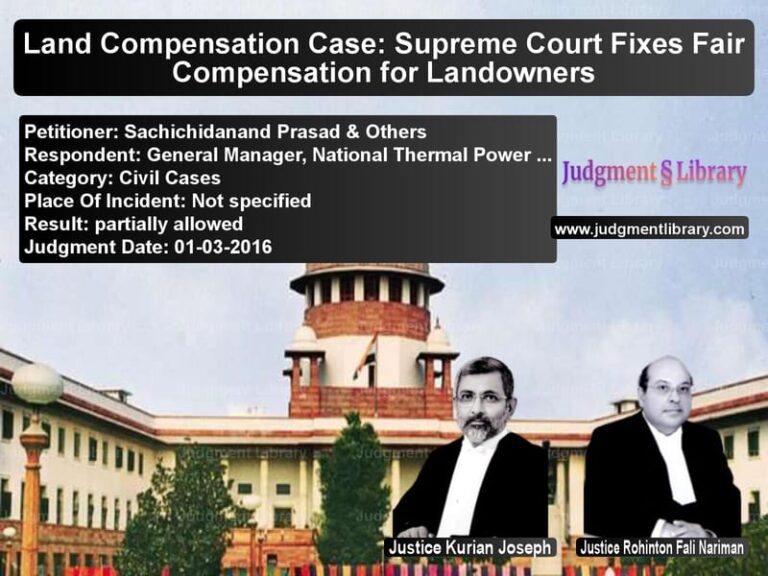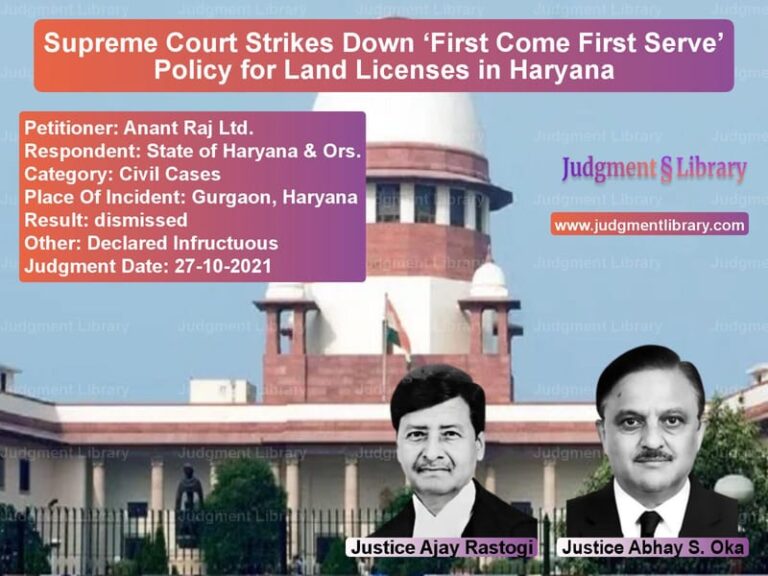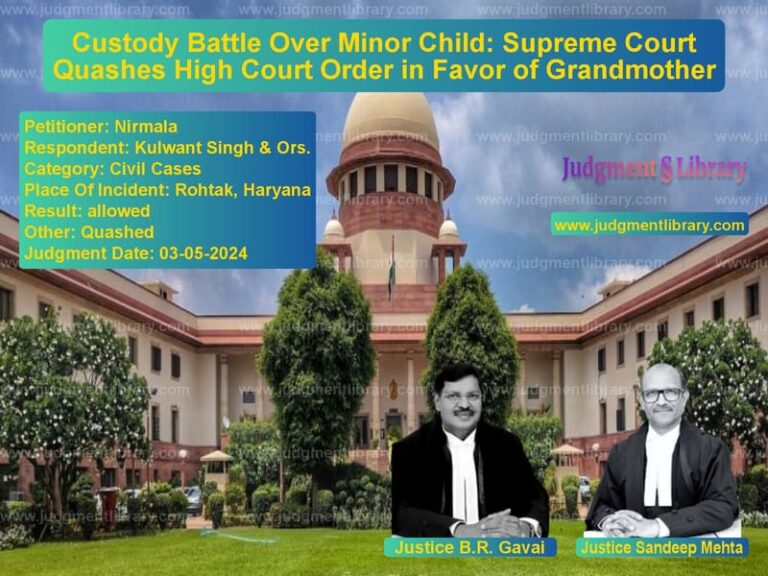Religious Trust Land Dispute: Supreme Court Remands Case for Fresh Consideration
The Supreme Court of India recently delivered a judgment in the case of Ujagar Singh (Dead) Through LRs & Anr. vs. Punjab State & Others, which revolved around a land dispute concerning a religious shrine and its ownership. The primary issue in this case was whether the land in question belonged to a religious and charitable trust or was subject to surplus land provisions under the Punjab Land Reforms Act, 1972.
Background of the Case
The appellants, followers of the religious shrine Dam Dama Baba Sahib Singh of Una, filed a suit seeking a declaration that the land in question was dedicated to the religious and charitable institution and could not be declared surplus under land reform laws. They also sought a perpetual injunction against the Punjab State and other respondents to prevent further alienation of the land.
According to the appellants, the shrine had been worshipped for generations and was managed by Baba Madhusudan Singh. They contended that after the partition of India, land was allotted to the Bedi families of Una in exchange for land lost in Pakistan. A significant portion of this land, they argued, was meant for the shrine but was unlawfully transferred by Baba Madhusudan Singh to his daughter and the Punjab Agricultural Department.
The Punjab government, on the other hand, declared a portion of this land as surplus under the Land Reforms Act. The appellants challenged this decision, asserting that religious and charitable institutions were exempt from surplus land provisions.
Trial Court’s Decision
The Trial Court ruled against the appellants, stating that they had failed to provide sufficient evidence to prove that the land was dedicated to the shrine. The Court found that while the land had been managed by religious figures, there was no legal documentation establishing it as a religious endowment.
Additionally, the respondents argued that the Civil Court did not have jurisdiction over the case under Section 21 of the Punjab Land Reforms Act. However, the Trial Court rejected this claim, stating that the issue of jurisdiction was not raised during the proceedings.
First Appellate Court’s Decision
The appellants then filed an appeal before the Additional District Judge of Hoshiarpur. The First Appellate Court partly ruled in their favor, holding that a 133/290 share of the land was indeed of religious and charitable nature and, therefore, could not be declared surplus by the government. The court restrained the respondents from transferring or declaring this portion of the land as surplus.
High Court’s Decision
The Punjab & Haryana High Court overturned the First Appellate Court’s ruling and dismissed the appellants’ claim. The High Court held that the Civil Court lacked jurisdiction under Section 21 of the Punjab Land Reforms Act, which bars the jurisdiction of civil courts in matters related to surplus land declarations.
It further stated that the appellants had failed to challenge the surplus land order before the designated land reform authorities, making their suit unsustainable in a Civil Court.
Supreme Court’s Judgment
The Supreme Court, after examining the facts, overturned the High Court’s ruling and reinstated the First Appellate Court’s findings. The key observations made by the Supreme Court were:
- The issue of jurisdiction under Section 21 of the Land Reforms Act was not raised by the respondents in the Trial Court, and they could not introduce it for the first time in the High Court.
- The appellants’ suit was not a challenge to the validity of the surplus order but rather a declaration of ownership, which falls within the jurisdiction of Civil Courts.
- Religious and charitable institutions are often exempt from surplus land provisions, and their ownership claims must be examined separately from regular surplus land proceedings.
Accordingly, the Supreme Court set aside the High Court’s order and remanded the case for fresh consideration, stating:
“In view of the above, the High Court’s order is set aside. The matter is remitted back to the High Court for fresh consideration on merits in accordance with law.”
Legal Implications
This judgment has significant implications for land disputes involving religious and charitable institutions. The key takeaways from the ruling are:
- Civil Courts retain jurisdiction over ownership disputes, even if the land in question has been declared surplus under land reform laws.
- Jurisdictional objections must be raised at the appropriate stage in the judicial process and cannot be introduced at a later appeal stage.
- Land belonging to religious and charitable institutions requires special consideration and may be exempt from land ceiling laws.
Conclusion
The Supreme Court’s decision in this case underscores the importance of procedural fairness in land disputes. By remanding the case for fresh consideration, the Court ensured that ownership claims involving religious trusts are evaluated on merit rather than being dismissed on technical jurisdictional grounds.
Petitioner Name: Ujagar Singh (Dead) Through LRs & Anr..Respondent Name: Punjab State & Others.Judgment By: Justice Vikram Nath, Justice Prashant Kumar Mishra.Place Of Incident: Hoshiarpur, Punjab.Judgment Date: 09-07-2024.
Don’t miss out on the full details! Download the complete judgment in PDF format below and gain valuable insights instantly!
Download Judgment: ujagar-singh-(dead)-vs-punjab-state-&-other-supreme-court-of-india-judgment-dated-09-07-2024.pdf
Directly Download Judgment: Directly download this Judgment
See all petitions in Property Disputes
See all petitions in Landlord-Tenant Disputes
See all petitions in Contract Disputes
See all petitions in Judgment by Vikram Nath
See all petitions in Judgment by Prashant Kumar Mishra
See all petitions in allowed
See all petitions in Remanded
See all petitions in supreme court of India judgments July 2024
See all petitions in 2024 judgments
See all posts in Civil Cases Category
See all allowed petitions in Civil Cases Category
See all Dismissed petitions in Civil Cases Category
See all partially allowed petitions in Civil Cases Category

